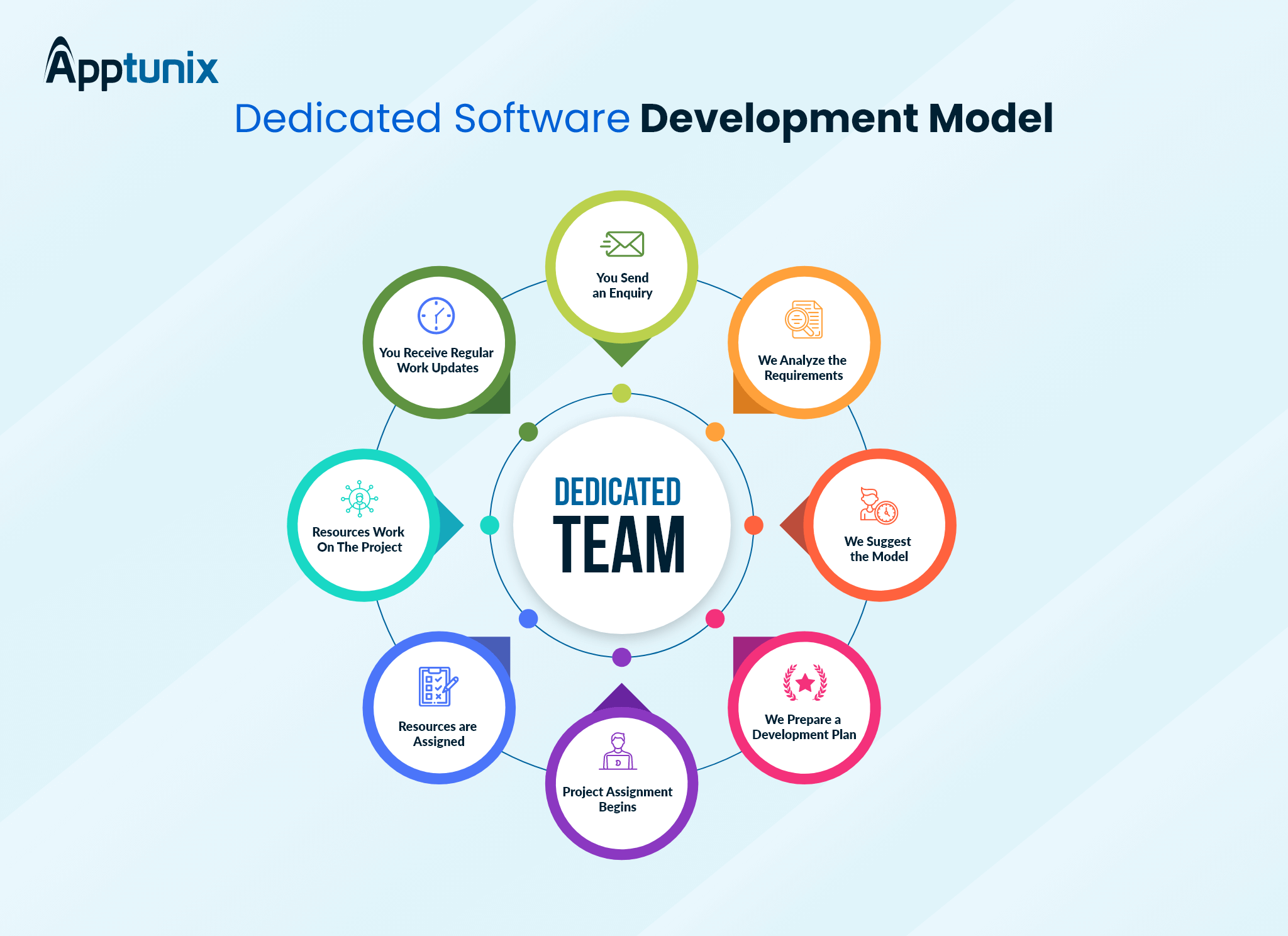Software dedicated teams play a crucial role in enhancing productivity and fostering collaboration within software development projects. Let’s explore the intricacies of these specialized teams and how they can benefit your projects.
In the following paragraphs, we will delve deeper into the components, strategies, and advantages of having a software dedicated team at your disposal.
Overview of a Software Dedicated Team

A software dedicated team is a group of professionals who are solely focused on a specific software development project. These team members work exclusively on the project and are fully committed to its success.
Some benefits of having a dedicated team for software development include increased efficiency, better communication, higher quality output, and quicker response times to issues or changes. With a dedicated team, there is also better collaboration and a deeper understanding of the project requirements.
In comparison to other software development approaches, a dedicated team offers greater consistency and stability throughout the project. The team members become experts in the project domain, leading to smoother development processes and improved overall performance.
Roles and Responsibilities

In a software dedicated team, each member plays a crucial role in ensuring the success of the project. Let’s explore the key roles and responsibilities within such a team.
Project Manager
The project manager is responsible for overseeing the entire project, including planning, execution, and delivery. They communicate with stakeholders, set goals, and ensure that the project stays on track.
Software Developer
Software developers are responsible for writing, testing, and debugging code to create functional software applications. They work closely with the project manager to understand project requirements and meet deadlines.
Quality Assurance (QA) Engineer
QA engineers test the software to identify bugs, defects, and areas for improvement. They work closely with developers to ensure that the software meets quality standards before release.
UI/UX Designer
UI/UX designers focus on creating a user-friendly interface and experience for the software. They collaborate with developers to ensure that the software is visually appealing and easy to use.
DevOps Engineer, Software dedicated team
DevOps engineers focus on automating processes, deploying software efficiently, and ensuring the reliability of the software infrastructure. They work closely with developers and QA engineers to streamline the development process.
Roles Assignment and Coordination
Assigning roles within a software dedicated team is typically done based on individual skills, experience, and expertise. The project manager is responsible for delegating tasks and ensuring that team members work together cohesively. Regular meetings, communication channels, and project management tools are used to coordinate roles effectively within the team.
Team Composition and Skillsets

In order to ensure the success of a software dedicated team, it is essential to have the right composition of team members with the necessary skillsets. Each member plays a crucial role in the development process, contributing their expertise to achieve the team’s goals.
Ideal Composition of a Software Dedicated Team
- Developers: These are the backbone of the team, responsible for coding, programming, and implementing software solutions.
- Testers: Quality assurance professionals who ensure that the software meets the required standards through testing and debugging.
- Project Managers: Oversee the overall progress of the project, coordinate team efforts, and ensure timely delivery within budget constraints.
- UI/UX Designers: Focus on creating user-friendly interfaces and enhancing the overall user experience of the software.
- Technical Leads: Provide technical guidance, mentorship, and support to team members, ensuring that best practices are followed.
Essential Skillsets Required for Team Members
- Developers: Proficiency in programming languages, problem-solving skills, knowledge of software development methodologies.
- Testers: Understanding of testing techniques, attention to detail, ability to identify and report bugs effectively.
- Project Managers: Strong leadership skills, communication skills, project planning and execution expertise.
- UI/UX Designers: Creativity, knowledge of design tools, understanding of user behavior and design principles.
- Technical Leads: Deep technical expertise, ability to mentor and guide team members, strategic thinking.
Comparison of Skillsets for Different Roles
| Role | Skillsets |
|---|---|
| Developer | Programming languages, problem-solving, software development methodologies |
| Tester | Testing techniques, bug identification, attention to detail |
| Project Manager | Leadership, communication, project planning, execution |
| UI/UX Designer | Creativity, design tools, user behavior understanding |
| Technical Lead | Technical expertise, mentorship, strategic thinking |
Collaboration and Communication: Software Dedicated Team
Effective collaboration and communication are essential components of a successful software dedicated team. By fostering a collaborative environment and maintaining open lines of communication, team members can work together efficiently towards achieving common goals.
Fostering Collaboration
Collaboration within a dedicated team is often fostered through regular team meetings, brainstorming sessions, and collaborative tools. By encouraging team members to share ideas, provide feedback, and work together on tasks, a sense of unity and shared purpose is established.
Importance of Effective Communication
Effective communication is crucial in a software dedicated team to ensure that all team members are on the same page, understand project requirements, and can address any issues or challenges effectively. Clear and timely communication helps prevent misunderstandings, reduces errors, and enhances overall team productivity.
Strategies for Seamless Communication
- Utilize collaboration tools: Implementing tools such as Slack, Microsoft Teams, or project management software can streamline communication and facilitate easy sharing of information among team members.
- Establish communication protocols: Setting clear guidelines for communication channels, response times, and meeting schedules can help maintain consistency and reliability in team communication.
- Encourage open dialogue: Creating a culture where team members feel comfortable sharing their thoughts, concerns, and ideas openly can improve overall communication and foster a sense of trust within the team.
- Regular check-ins: Conducting regular check-in meetings or stand-ups provides an opportunity for team members to update each other on progress, discuss any roadblocks, and align on priorities.
Project Management and Workflow
Project management plays a crucial role in the success of software dedicated teams. It involves the methodologies and processes used to plan, execute, monitor, and control projects effectively.
Project Management Methodologies
- Agile: A popular methodology that focuses on iterative development, collaboration, and flexibility in responding to change.
- Scrum: A framework within the Agile methodology that emphasizes teamwork, accountability, and iterative progress through sprints.
- Kanban: A visual system for managing work as it moves through different stages to ensure continuous delivery.
Workflow Processes
The workflow of a dedicated team typically involves the following stages:
- Ideation: Brainstorming and conceptualizing ideas for the project.
- Planning: Defining project scope, setting milestones, and creating a timeline.
- Development: Executing the project tasks based on the plan.
- Testing: Conducting quality assurance and testing to ensure the software meets requirements.
- Deployment: Releasing the software to users or clients.
Tools and Software for Project Management
Software dedicated teams utilize various tools to streamline project management processes:
- Jira: A popular tool for Agile project management, enabling teams to plan, track, and release software efficiently.
- Trello: A visual collaboration tool that organizes project tasks and facilitates team communication.
- Asana: A platform for team collaboration and project management, allowing users to track tasks and deadlines.
Flexibility and Scalability
When working with a software dedicated team, one of the key advantages is the flexibility it offers in handling project requirements. The team is equipped to adapt to changes quickly and efficiently, ensuring that the project stays on track even when faced with unexpected challenges.
Flexibility in Handling Project Requirements
Having a dedicated team means having a group of experts who can easily pivot and adjust to new project requirements. Whether it’s changing priorities, additional features, or unforeseen obstacles, the team can swiftly reorganize and reallocate resources to meet the evolving needs of the project.
- Team members can switch roles or take on new responsibilities as needed, ensuring that every aspect of the project is covered.
- Flexible working hours and remote collaboration allow the team to be available when required, regardless of time zones or geographical locations.
- Regular communication and feedback loops enable quick decision-making and adjustments to the project plan.
Scalability Options
Scalability is another benefit of working with a software dedicated team, as it allows for the efficient allocation of resources based on project needs. The team can easily scale up or down depending on the size and complexity of the project, ensuring optimal performance and delivery.
By adding or removing team members, adjusting workloads, and leveraging specialized skills when necessary, the team can adapt to varying project scopes and timelines.
- Scalability options include ramping up development efforts for tight deadlines or scaling back during quieter phases of the project.
- Utilizing a flexible pricing model allows for cost-effective scaling based on project requirements, helping to maximize resources and efficiency.
Adapting to Changing Project Needs
Adaptability is a core strength of a software dedicated team, as it enables the team to respond to changing project needs in a proactive and agile manner. By staying attuned to project dynamics and client feedback, the team can anticipate shifts in requirements and adjust resources accordingly.
- Regular project reviews and retrospectives help identify areas for improvement and fine-tune resource allocation for optimal performance.
- Flexible contracts and engagement models allow for seamless adjustments to team size and composition, ensuring that the project remains on track and within budget.
Ending Remarks
In conclusion, software dedicated teams offer a structured approach to development, ensuring seamless communication, efficient project management, and adaptability to changing needs. Consider integrating a dedicated team into your software projects for optimal results.
Essential FAQs
What is a software dedicated team?
A software dedicated team is a specialized group of professionals solely focused on developing and maintaining software products, ensuring dedicated attention to project requirements and objectives.
How are roles assigned within a software dedicated team?
Roles within a software dedicated team are typically assigned based on individual strengths, expertise, and project needs, ensuring a balanced distribution of responsibilities.
What tools are commonly used for project management in software dedicated teams?
Software dedicated teams often utilize tools like Jira, Trello, or Asana for project management, facilitating efficient task tracking and team collaboration.
